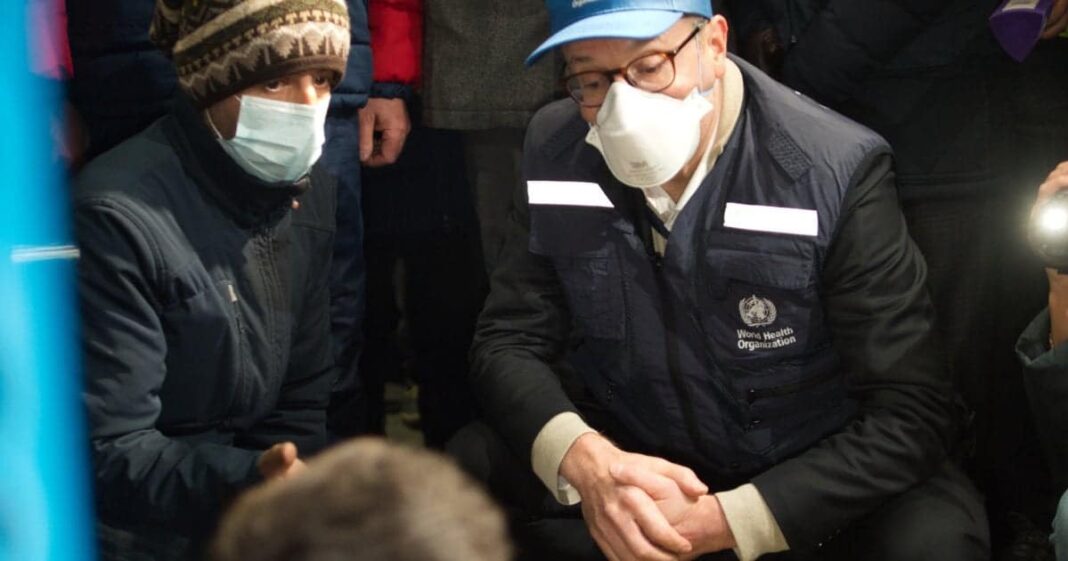For many refugees and migrants across the world, the onset of winter marks the beginning of a potentially life-threatening period.
Many of us welcome the first signs of winter and snow with delight. We associate it with warmth: knitted jumpers, cozy fireplaces, end of year festivities, and children playing in the snow. But for others, the onset of winter marks the beginning of a potentially life-threatening period.
We see it every day across Europe: the lives, health and well-being of refugees and migrants are put at risk because of geopolitics.
Over recent weeks, thousands of undocumented migrants have been stranded in no-man’s land on Belarus’s borders with Poland, Latvia and Lithuania. Several have lost their lives; among them, women and children. Over 60% of the migrants that experts from WHO/Europe spoke to during a recent mission to the Belarus-Lithuania border needed medical attention.
During my visit last month to a site sheltering 2000 migrants in Belarus, I saw firsthand the vulnerability of their situation. Those I met – families with children, young and old – were living in very difficult, overcrowded conditions with a lack of sanitary facilities. They were tired and desperate, but still holding on to the hope of a better life.
Simultaneously, on the other side of Europe, hundreds of people are risking their lives to cross the seas in Europe, over the English Channel or Mediterranean. Now, deaths on these treacherous journeys barely make headlines. Just in the last month, 90 people have lost their lives in the Mediterranean and at least 34 in the English Channel.
When looking beyond Europe and central Asia, we can already anticipate that more people will have to flee the rapidly unfolding humanitarian crisis in Afghanistan. Right now, 8.7 million people in Afghanistan aren’t getting enough food, and winter in Afghanistan can be brutal. The United Nations estimates a staggering 274 million people will need humanitarian assistance next year, which is a 17% rise on this year. Providing humanitarian assistance to countries in need can go a long way in addressing the reasons why so many people leave in search of a better life in the first place.
On all these fronts, WHO is working with partners to alleviate human suffering, delivering essential supplies; engaging with national authorities to address immediate needs, including the provision of sanitary facilities; establishing medical units; and improving prevention measures, such as testing and vaccination, against COVID-19. Since visiting Belarus, concrete steps have been taken by local and national authorities to improve primary health care provision and sanitation facilities for the migrants. But no matter how important these actions, they are no substitute for more sustainable solutions.
This is a make-or-break moment. Regardless of political consensus or the lack thereof, refugees and migrants must receive humanitarian assistance and access to health care. As the WHO European Region faces a new wave of COVID-19 with the emergence of a new variant and sharply rising cases, we must ensure protection against COVID-19 for the most vulnerable. This pandemic has taught us that no one is safe until everyone is safe.
Health should never be a matter of politics, and access to health must be safeguarded as a fundamental human right. WHO/Europe has long championed migrant and refugee health, with support to countries in preparing for large arrivals of refugees and migrants, and in developing health systems that are inclusive and migrant-friendly. It is a principle of the European Programme of Work to leave no one behind. But we need to accelerate this work with cross-sectoral and political backing.
This is why we are inviting health ministers from the European as well as the African and Eastern Mediterranean regions to a high-level summit in March 2022 to find a common way forward and mobilize political commitment to ensure the health of refugees and migrants.
Good health is something that everyone, everywhere, should be able to enjoy. A change of season should not be a matter of life or death. Health is not a privilege: it is a fundamental right for all people, including refugees and migrants.
Let’s afford all human beings respect, dignity and access to health care, not only this winter, but for years to come.









